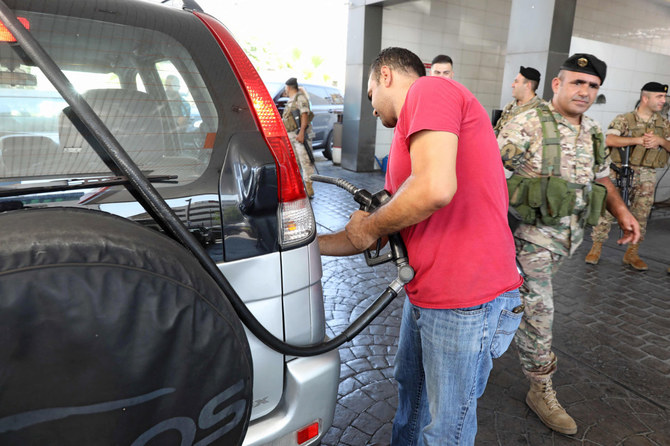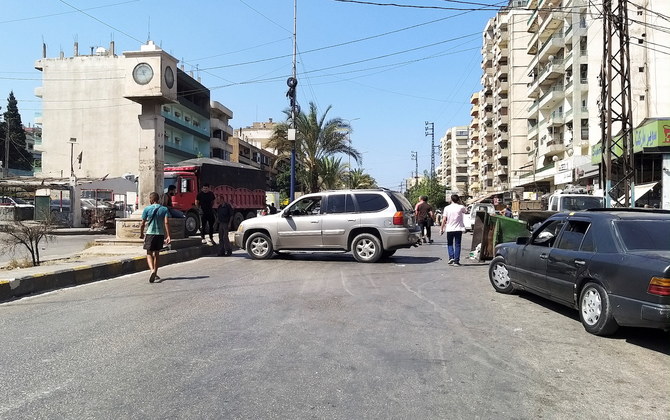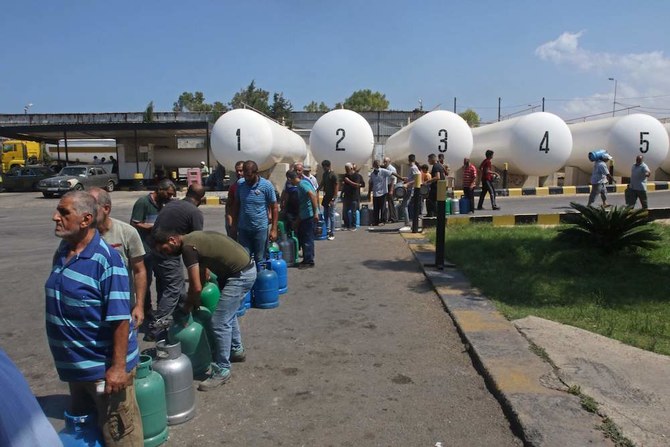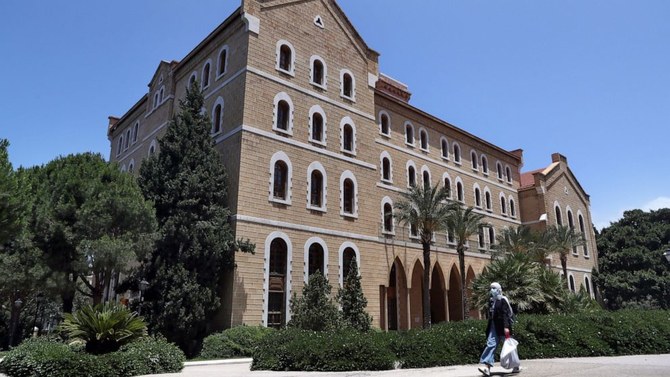دائماً عكار تدفع ضريبة الدم والانهيار الاقتصادي. يسقط لها شهداء وضحايا في الجيش، في البارد، في جرود الضنية وعرسال، في التفجيرات الارهابية، في الكوارث، في الجنوب في مواجهة العدو وعلى مساحة الوطن، في المرفاء، في الجشع للمحروقات والاحتكار والتهريب والتقصير العام وفي الانماء غير المتوازن. فقط رحمة الله بهذه البقعة العزيزة من لينان واهلها الاحباء. […]

By NAJIA HOUSSARI — arabnews.com — BEIRUT: Lebanon’s army on Saturday seized fuel from petrol pumps to curb hoarding amid crippling shortages. The country is grappling with a financial crisis and foreign currency reserves are fast depleting, while its national currency has lost more than 90 percent of its value on the black market. Traffic in Beirut and other places was low on Saturday, and security forces temporarily closed the northern Aboudiyeh Border Crossing with Syria because of a power generator malfunction. Dozens of institutions surprised their employees with a day of unplanned leave next Monday, while shops and institutions in Beirut’s center were informed they would not be supplied with electricity because of the lack of diesel.
Activists shared a video on social media showing a crowd in the town of Ali Al-Nahri, in the Bekaa Valley, protesting around Hussainia Mosque, where Hezbollah member and former minister Hussein Hajj Hassan was giving a speech. Eyewitnesses told Arab News that around 50 people objected to Hassan going up to the pulpit and speaking. “They called on him to get back, throwing insults at him and saying, ‘We are hungry.’” The MP had to leave the town, shortening his mosque speech, amid a heavy army deployment. Army intelligence on Saturday arrested four of the people who had objected to Hassan’s presence. But they were released due to popular pressure. People objecting to the arrests blocked the road between Ali Al-Nahri and the eastern village of Massa, which is a vital road for Hezbollah. This road helps the party access Syria’s Al-Shaara region, where its military posts are located. Protesters accused Hezbollah of using the town as “a road to smuggle diesel to Syria.”
Moreover, a village resident who was present during Friday’s incident faced arrest today by an unknown party. Hassan Makkhal shared his arrest from his home on Facebook. Makkhal is said to be a critic of the Hezbollah figure.

By courtney Mares — ncregister.com — BEIRUT, LEBANON — The leader of the Maronite Catholic Church received threats from Hezbollah supporters this week after calling for an end to missile launches from Lebanese territory. Bechara Boutros Cardinal Rai had called for peace, saying that Lebanon should remain neutral in regional conflicts in his Aug. 8 homily, two days after Hezbollah fired 19 rockets into Israel from southern Lebanon. Hezbollah is a Shiite Muslim political and militant group designated a terrorist organization by the U.S. government. The group has strong alliances with Bashar al-Assad’s regime in Syria, and with Iran in its conflicts with Sunni-majority Gulf states. Without mentioning Hezbollah by name, the Maronite Patriarch of Antioch said that it was unacceptable for “a party to make decisions on war” without the quorum of two thirds required by the country’s constitution. “We call upon the Lebanese army … to prevent the launching of missiles from Lebanese territory, not for the sake of Israel’s safety, but rather for the safety of Lebanon,” Cardinal Rai said.
Supporters of Hezbollah responded by threatening the cardinal’s life with social media posts that pictured Cardinal Rai with a noose around his neck. In a Facebook post, a person from Beirut’s south suburbs wrote in Arabic: “You don’t think we know how to hang?“ and “An eye for an eye, and a tooth for a tooth…Initiator [Patriarch] shall bear the brunt of blame.” In Defence of Christians, a human rights organization that has sources on in Lebanon, told CNA that there have been people in the streets in predominantly Shiite areas calling Cardinal Rai a traitor and Zionist collaborator. Political leaders within Lebanon and abroad sent messages of solidarity to the Maronite patriarch after the public threats.

by rsf.org — Reporters Without Borders (RSF) condemns the intimidatory methods used by certain political groups in Lebanon to try to silence journalists. The latest victim is Yumna Fawaz, who has been the target of a social media hate campaign for the past week or so by supporters of the Free Patriotic Movement (FPM) and its powerful ally, Hezbollah. A freelancer who was an anchor at Lebanon’s Al Jadeed TV channel for years, Fawaz has been targeted since she posted tweets calling for Lebanese President Michel Aoun, the FPM’s founder, to be held to account for his share of the responsibility in last year’s Beirut port explosion. As well as having been subjected to a flood of insults and hate speech, she has been falsely accused of having had a role in the port explosion on the basis of one of her old TV reports circulated by the hate campaign’s participants. Filmed in 2012, it shows her visiting a site in Idlib, in northern Syria, where the Syrian opposition manufactured explosives from ammonium nitrate. As it was a warehouse containing 2,750 tons of ammonium nitrate that exploded in Beirut’s port in August 2020, the video proves her involvement, her critics absurdly claim.
Fawaz told RSF she plans to file a complaint bringing defamation and insult accusations against the leaders of the political groups she believes to be behind this orchestrated smear campaign, especially the FPM and Hezbollah. She said this is not the first time she has been targeted by FPM members. Just two months ago, she was insulted and attacked by a female member of FPM, against whom she subsequently brought a complaint. She also receives threats via WhatsApp and is increasingly concerned for her safety. “We fully support Yumna Fawaz, a journalist who simply called for more transparency in a matter of the utmost interest to the Lebanese public, and we condemn the despicable methods that certain political groups in Lebanon have become accustomed to using against journalists,” said Sabrina Bennoui, the head of RSF’s Middle East desk.
:quality(70)/cloudfront-eu-central-1.images.arcpublishing.com/thenational/EUABODUY4ABNZ7OBOSEMAK4FOA.jpg)
By Sunniva Rose — thenationalnews.com — The outcome of the parliamentary session could have potentially replaced the judicial inquiry with a parliamentary one, much to the dismay of families of victims who believe that members of Parliament want to protect politicians under investigation. Parliament speaker Nabih Berri scheduled the session following a petition signed in late July by MPs requesting a vote that would be the first step towards establishing a special court for trying ministers and presidents. The MPs who signed the petition were members of Mr Berri’s political party, the Amal movement, as well as its close ally, Iran-backed Hezbollah, in addition to former prime minister-designate Saad Hariri’s Future Movement. The postponement of Thursday’s session “is a victory because their main objective was to set up a special tribunal for presidents and ministers which is just a way to bury decisions,” said Ibrahim Hoteit, who lost his brother, Tharwat, in the explosion on August 4, 2020. At least 214 people died.
“Parliament realised the judge is working seriously and is now trying to remove him,” said Wissam Lahham, a university professor and an expert in Lebanese constitutional law. “We don’t have a state, we have gangs who are fighting us to avoid justice,” said Mr Hoteit, a representative for a group of victims’ families. He said he suffered head, shoulder, legs and back injuries after an attack on peaceful protesters on Wednesday night. The group wanted to camp outside the Unesco palace, where Parliament meets, to pressure Mr Berri into cancelling Thursday’s session. Mr Hoteit said the attackers, who wore both civilian and military clothing, wounded at least nine people and chanted slogans in support of Mr Berri. The attack took place one kilometre away from the neighbourhood of Ain El Tineh, where Mr Berri lives. A representative of the Amal Movement did not respond to a request for comment.

By NAJIA HOUSSARI – arabnews.com — BEIRUT: Angry Lebanese blocked roads across the country on Thursday, a day after the central bank said it could no longer afford to subsidise fuel imports below the black market rate. As the economy crumbles and Lebanon’s foreign reserves dwindle, the decision has been considered a de facto lifting of fuel subsidies. Confrontations with soldiers erupted in Tripoli amid a shortage of diesel to run private generators, which are only available on the black market at double the subsidized price. Protests also erupted around the house of Prime Minister-designate Najib Mikati in Tripoli. Protesters from the southern town of Sarafand stormed the Al-Zahrani power plant demanding electricity as the diesel shortage is preventing the operation of private generators. They stressed “nepotism in distributing diesel to the powerful and barely giving any to ordinary people.”
People blocked roads in the north, south and east of the country in protest against the deteriorating living conditions. Motorists were trapped in long queues outside the remaining active petrol stations, rushing to fill up before the Ministry of Energy announced new prices. The cost of petrol is expected to at least triple, according to projections by the Information International think tank. The Lebanese pound has lost more than 90 percent of its value against the dollar on the black market in less than two years. Riad Salameh, governor of Lebanon’s central bank, informed President Michel Aoun that he “is unable to continue subsidizing fuel except under a law issued by parliament allowing the use of mandatory foreign exchange investments.”

by arabnews.com — BEIRUT: The Lebanese central bank (Banque du Liban) said it would offer a line of credit for fuel importers based on the market price for the Lebanese pound from Thursday, effectively ending a fuel subsidy that has drained its reserves since the country descended into financial crisis. The move, announced late on Wednesday, means fuel prices will rise steeply: One Lebanese broadcaster cited figures showing the price of unsubsidized 95 octane gasoline at more than four times the subsidized price. In a statement, the central bank said the decision will be effective Thursday and new prices will be determined by the Ministry of Energy. The decision comes amid an unfolding energy crisis that has plunged the country into hours of darkness, threatened hospitals and businesses with shutdown and sparked deadly violence among consumers and motorists looking for fuel.
It will spell more hardship for the growing number of people in poverty in a country whose currency has lost more than 90 percent of its value in less than two years, in what the World Bank has described as one of the sharpest depressions in modern history. But it should also alleviate crippling fuel supply shortages as incentives to smuggle and hoard heavily subsidized fuel disappear, said Nassib Ghobril, chief economist at Byblos Bank. Bank Governor Riad Salameh had said earlier in the day at a meeting of the Supreme Defense Council that the bank could no longer continue to offer lines of credit and subsidize fuel imports, a ministerial source and Al-Jadeed TV said. Since the onset of the crisis, the central bank had been effectively subsidizing fuel by using its dollar reserves to finance fuel imports at official exchange rates well below the rates on the parallel market.
توضيح من مكتب الرئيس سليمان بشأن وصول النيرات وتفريغها في العنبر ١٢ أوضح المكتب الاعلامي للرئيس العماد ميشال سليمان ان ما تداولته بعض الوسائل الإعلامية حول تصريح الرئيس سليمان من بكركي يوم أمس الخميس، فيه تحريف غير مقصود لما قاله الرئيس سليمان بالفيديو.. الرئيس سليمان قال ان نيترات الأمونيوم أفرغت في العنبر رقم ١٢ في […]

By NAJIA HOUSSARI — arabnews.com — BEIRUT: Dozens of Lebanese MPs announced on Wednesday that they will boycott a closed parliamentary session that many people fear will further shield from scrutiny politicians accused of negligence that resulted in the massive explosion at Beirut’s port a year ago. Speaker Nabih Berri has called for a plenary session to be held on Thursday. It was not clear whether it will focus on a long-running request by judicial investigator Judge Tarek Bitar, and some political blocs, to lift the immunity from politicians and officials so that they can be questioned about their parts in the disaster, or on the formation of a parliamentary investigation committee. If such a committee is established, parliament would handle the case and it would no longer be under the jurisdiction of the judicial investigator. It would then be up to the Supreme Council for the Trial of Presidents and Ministers to decide whether to prosecute the ministers and MPs accused by Bitar. The MPs boycotting Thursday’s session said: “It is aimed at bypassing the crime’s judicial investigation.”
Relatives of the victims of the explosion described it as “the session of shame.” They added that they intend to prevent MPs from entering UNESCO Palace in Beirut, where parliamentary sessions are currently being held because of coronavirus precautions, on Thursday. In a message posted on Facebook, William Noun, the brother of firefighter Joe Noun who died in the explosion, said: “We are going to face the rulers and their apparatus so that they do not approve laws that hide the truth.” A group representing the relatives of the victims said: “The parliamentary session aims to obliterate the truth and help the suspects escape punishment. The session comes as a continuation of a series of practices that violate the constitution and the law, undertaken by the ruling class to hamper the work of the judicial investigator or set red lines in the way of his work.” They called on MPs to “prevent parliament from reaching the required quorum or be considered accomplices in the wastage of our loved ones’ blood and the obliteration of the truth and justice.”

By GEORGI AZAR — arabnews.com — DUBAI: Lebanon’s oldest and most prestigious university, the American University of Beirut, has started rationing electricity on campus as the country’s fuel crisis exacerbates. The campus, made up of 64 buildings including the American University of Beirut Medical Center, will switch off its central air conditioning due to the shortage of fuel. The move came into effect Monday in order to “prioritize critical functions especially at the medical center,” a letter sent to faculty and staff, seen by Arab News, said. Human Resources Director Samar Diab Rouhana said the decision was due to “disruptions in fuel supplies in the country” and the fact that AUB’s fuel reserves have reached a critical threshold. Rationing will stay in place until Aug. 22, she said, with “exceptions made for buildings that house critical laboratories and heat-sensitive materials and equipment.”
The university, which was founded in 1866, also requested all faculty and non-essential staff to work remotely from Aug. 13 until Aug. 20. “In the meantime, the physical plant department will continue its efforts to secure fuel and rebuild the university’s fuel reserves,” the letter added. The university could not be reached for comment. Lebanon has faced months of severe fuel shortages that have caused hour-long lines at gas pumps and plunged the small Mediterranean country, dependent on private generators for power, into hours of darkness. Meanwhile, the state-owned Électricité du Liban provider is barely providing two to three hours of electricity in most regions. The shortages are blamed on smuggling to neighboring Syria, hoarding and the cash-strapped caretaker government’s inability to secure hard currency for fuel deliveries.



